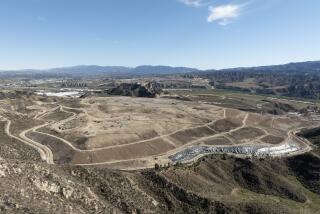Boulevard, Campo Residents Relieved : Indians Drop Plan for PCB Treatment Facility
- Share via
The Campo band of the Mission Indians is no longer considering a plan to operate a hazardous-waste facility on the Campo reservation--a proposal that for months caused a rare furor in the quiet communities of San Diego’s backcountry.
Ralph Goff, the tribal chairman, said Tuesday that the tribe has dropped the idea because the Kansas City, Mo., waste-disposal company that had proposed the facility failed to provide details that tribal leaders had requested.
“They haven’t lived up to their end of it,” Goff said tersely. Declining to discuss the matter further, he said: “It’s safe to say that we’re not negotiating with them any more. It’s just something that’s over with.”
Residents of the neighboring towns of Boulevard and Campo, who had mounted petition drives against the proposal and let loose a blizzard of letters to elected officials, greeted the news of the band’s decision with satisfaction and relief.
“It was a very big issue,” said Marion Henderson, head of the environmental committee of the Boulevard planning group. “We were very concerned about the possibility of leakage and spillage into the ground water. Everyone’s on wells out here.”
“Everybody’s real happy about it,” said Ken Moore, chairman of the planning group. “It was a real concern.”
The concern surfaced last fall after word got out that a firm called PCB Treatment Inc. had approached the leaders of the impoverished tribe with a plan for a facility that would drain oil contaminated with polychlorinated biphenyls (PCBs) out of old transformers.
PCBs, long used as coolants in electrical equipment but now banned in the United States, can cause cancer and damage the liver and immune system. Utility companies are required by federal law to retire and properly dispose of all equipment using PCBs.
The company proposed renting 10 acres on the reservation, where it would receive transformers from across California and drain the oil into drums. Company officials said they would then truck the drums out for disposal in incinerators in Nevada and Illinois.
To tribal leaders, the scheme held out hope of income and jobs--work for eight full-time employees, a $25,000 lease, and up to $200,000 in annual payments. Most of the estimated 150 people living on the 15,000-acre reservation are unemployed, and the reservation is considered among the poorest in Southern California.
But residents of the neighboring towns quickly mobilized against the proposal, planting petitions in general stores and boning up on the dangers of PCBs. They collected documents on PCB Treatment Inc. under the federal Freedom of Information Act, and expressed their alarm to a dozen different agencies and officials.
Their concerns ranged from trucking risks to plant security to PCB Treatment’s record of safety violations at other facilities. One principal fear concerned regulation of the plant, since the reservation is subject to federal but not state law.
“And you know that trying to get the federal government moving is like trying to move the Grant Grill,” Marion Henderson cracked Tuesday.
“It was one of the greatest rumor mills that I’ve ever been involved in,” said Tom Dowell, superintendent for the federal Bureau of Indian Affairs regional office in Riverside. “There were rumors that the project was under way, and I received one call that the actual unloading had started.”
County, state and federal officials all tried to intervene, insisting that extensive environmental impact studies should be required. U.S. Rep. Duncan Hunter (R-Coronado) attempted repeatedly to set up meetings between the two sides, and the U.S. Environmental Protection Agency hired an environmental consulting firm run by Indians to assess the proposal.
But PCB Treatment Inc. and its one-man local subsidiary, PCB Inc. of San Diego, never provided detailed plans that the tribe and the EPA requested. Terry Wilson, a spokesman for the EPA regional office in San Francisco, said Tuesday that he had been led to believe “that the company that was going to be working with them pulled back on the project.”
Officials at PCB Treatment Inc. in Kansas City did not return telephone calls to their office Tuesday. Their local representative, Bob Fuger, who originally proposed the plan to the Indians, could not be reached at his tax-consulting firm in San Diego.
Goff declined to say whether the tribal council had voted down the proposal at its monthly meeting, which was reportedly scheduled for Sunday. He said those were tribal matters and he considered them private.
More to Read
Sign up for Essential California
The most important California stories and recommendations in your inbox every morning.
You may occasionally receive promotional content from the Los Angeles Times.










